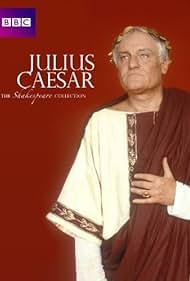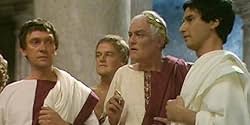The assassination of the would be ruler of Rome at the hands of Brutus and company has tragic consequences for Brutus and the republic.The assassination of the would be ruler of Rome at the hands of Brutus and company has tragic consequences for Brutus and the republic.The assassination of the would be ruler of Rome at the hands of Brutus and company has tragic consequences for Brutus and the republic.
Photos
Storyline
Did you know
- TriviaDirector Herbert Wise felt that Julius Caesar should be set in the Elizabethan era, but as per the emphasis on realism, he instead set it in a Roman milieu. Wise argued that the play "is not really a Roman play. It's an Elizabethan play and it's a view of Rome from an Elizabethan standpoint." However, of setting the play in Shakespeare's day, Wise stated "I don't think that's right for the audience we will be getting. It's not a jaded theatre audience seeing the play for the umpteenth time: for them that would be an interesting approach and might throw new light on the play. But for an audience many of whom won't have seen the play before, I believe it would only be confusing."
- GoofsThe sound of retracting blades can be heard as Caesar is stabbed.
- ConnectionsFeatured in The Story of English: A Muse Of Fire (1986)
Featured review
The sets and the crowd scenes are generally well handled, but they are not what elicit a rating of 9 stars from me. Rather, the quality of the acting is what makes this production of "Julius Caesar" so commendable.
Richard Pasco is especially powerful as Brutus, with a performance that goes astray in only a couple of small respects. Near the end of Act IV, Pasco as Brutus is too rough and imperious in his interaction with Claudius and Varro; the text of the play suggests to me that Brutus was being solicitous rather than overbearing in his instructions to those subordinates. In addition, the death of Brutus was not quite as persuasively staged as the death of Cassius. Still, those two minor blemishes do not detract from a performance that splendidly captures the depths of one of Shakespeare's most complicated characters.
Having mentioned Cassius, I should straightaway commend David Collings for an excellent performance that captures the nuances of the character. Collings is certainly high-strung at times, but he is thereby conveying accurately the personality of Cassius as Shakespeare depicts it. From beginning to end, Collings combines subtlety and energy in a memorable display of fine acting.
Sam Dastor is engagingly witty in his portrayal of Casca (a character who disappears from the play after the assassination of Caesar), and Alexander Davion is adept as Decius Brutus whose expostulations with Caesar play a small but pivotal part in the unfolding of the play's events.
Keith Michell is generally impressive as Marc Antony. He begins in the mode of an Australian playboy who then rapidly matures into the desolate follower of a murdered master. His delivery of the "Friends, Romans, countrymen" oration is deft, and his performance in the second half of the play captures well both the valor and the arrogance of Antony. My one criticism is that the voice-over of the "O, pardon me, thou bleeding piece of earth" soliloquy does not work well. Though voice-overs are elsewhere used to good effect in this production, the soliloquy just mentioned should have been spoken throughout. During the voice-over, Michell looks as though he is bursting to speak (indeed, to yell), and he should have been given free rein to do so.
Virginia McKenna is excellent as Portia, whose voice-overs are especially effective. Elizabeth Spriggs is a fine Calpurnia, whose glowering at Decius Brutus is both funny and poignant.
The only lackluster performance is that of Leonard Preston in the minor role of Titinius. An actor playing that role should appear distraught in the aftermath of the death of Cassius, but instead Preston seems largely unmoved and even slightly jocund. Titinius is the only character who commits suicide unassistedly. Preston does not convey the frame of mind that would lead someone to such a desperate tack.
Despite some minor flaws, this production is admirable in multiple respects -- not least in its retention of nearly the full text. I heartily recommend it.
Richard Pasco is especially powerful as Brutus, with a performance that goes astray in only a couple of small respects. Near the end of Act IV, Pasco as Brutus is too rough and imperious in his interaction with Claudius and Varro; the text of the play suggests to me that Brutus was being solicitous rather than overbearing in his instructions to those subordinates. In addition, the death of Brutus was not quite as persuasively staged as the death of Cassius. Still, those two minor blemishes do not detract from a performance that splendidly captures the depths of one of Shakespeare's most complicated characters.
Having mentioned Cassius, I should straightaway commend David Collings for an excellent performance that captures the nuances of the character. Collings is certainly high-strung at times, but he is thereby conveying accurately the personality of Cassius as Shakespeare depicts it. From beginning to end, Collings combines subtlety and energy in a memorable display of fine acting.
Sam Dastor is engagingly witty in his portrayal of Casca (a character who disappears from the play after the assassination of Caesar), and Alexander Davion is adept as Decius Brutus whose expostulations with Caesar play a small but pivotal part in the unfolding of the play's events.
Keith Michell is generally impressive as Marc Antony. He begins in the mode of an Australian playboy who then rapidly matures into the desolate follower of a murdered master. His delivery of the "Friends, Romans, countrymen" oration is deft, and his performance in the second half of the play captures well both the valor and the arrogance of Antony. My one criticism is that the voice-over of the "O, pardon me, thou bleeding piece of earth" soliloquy does not work well. Though voice-overs are elsewhere used to good effect in this production, the soliloquy just mentioned should have been spoken throughout. During the voice-over, Michell looks as though he is bursting to speak (indeed, to yell), and he should have been given free rein to do so.
Virginia McKenna is excellent as Portia, whose voice-overs are especially effective. Elizabeth Spriggs is a fine Calpurnia, whose glowering at Decius Brutus is both funny and poignant.
The only lackluster performance is that of Leonard Preston in the minor role of Titinius. An actor playing that role should appear distraught in the aftermath of the death of Cassius, but instead Preston seems largely unmoved and even slightly jocund. Titinius is the only character who commits suicide unassistedly. Preston does not convey the frame of mind that would lead someone to such a desperate tack.
Despite some minor flaws, this production is admirable in multiple respects -- not least in its retention of nearly the full text. I heartily recommend it.
Details
- Release date
- Countries of origin
- Language
- Also known as
- The Complete Dramatic Works of William Shakespeare: Julius Caesar
- Production companies
- See more company credits at IMDbPro
Contribute to this page
Suggest an edit or add missing content













